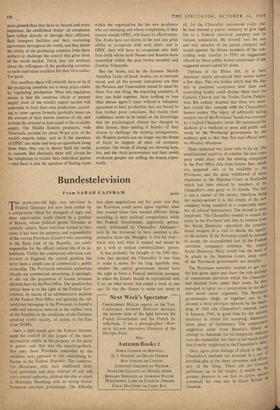Bundestelevision
From SARAH GAINHAM BONN
HE seven-year-old fight over television in I Federal Germany has now been settled by a compromise which for disregard of logic and sheer opportunism could almost be a product of Britain, whose political genius Germans so wistfully admire. Since television existed in Ger- many it has been the property and responsibility of the various Provinces (Lander) who, according to the Basic Law of the Republic, are solely responsible for the official cultural life of its in- habitants. Unlike the commercial television con- troversy in England, the central question has never been a simple one of commercial v. public ownership. The Provincial television authorities already use commercial advertising, if sparingly, to eke out the proportion of licence revenues allowed them by the Post Office. The question has always been as to the right of the Federal Gov- ernment, by means of an administrative decision of the Federal Post Office and ignoring the cul- tural trust belonging to the Provinces, to found a radio and television network as the unified voice of the Republic to the remainder of the German- speaking world—mainly, of course, to the East Zone (DDR).
Such a right would give the Federal Govern- ment the control of this largest of the mass- information media as the property of the party in power, and that was the stumbling-block. Not only those Provinces controlled by the socialists were ,opposed to this centralising in- fluence in the Federal Republic. The conserva- tive Bavarians, with their traditional lively local patriotism and deep mistrust of any and every central authority, disliked the idea as much as Hanseatic Hamburg with its strong Social- Democrat city-state government. The difficulty that drew negotiations out for years was that the Provinces could never agree together what they wanted (since they wanted different things according to their political complexions), while the Federal Government, apparently perma- nently dominated by Chancellor Adenauer- said by the irreverent to have received a dis- pensation from the Almighty to live for ever— knew very well what it wanted and meant to get it with or without commercialism : power.
It was probably the thought of the 1961 elec- tions that decided the Chancellor it was time to make a move. So the long squabble over whether the central government should have the right to form a Federal television company in which the Lander should be represented, and, if so, on what terms, was ended a week or two ago. So was the chance to make any terms at all, for the Chancellor announced coolly that he had formed a parent company to give legal life to a Federal television company and its various subsidiaries. He himself was the one and only member of the parent company and would appoint the fifteen members of the con- trolling body (similar to ITV) on suggestions offered by those public bodies concerned—if the suggested names suited his plans.
Thirteen of the fifteen did; or at least Adenauer simply announced their names within a few days. The two bodies which had the dig- nity to postpone acceptance until their own controlling bodies could discuss them were the Catholic Church and the Trades Union Federa- tion. But nobody doubted that these two mem- bers would also coincide with the Chancellor's known wishes. The injury of arbitrarily taking matters out of the Provinces' hands was crowned by a typical Chancellor insult. He announced his decision at a weekend to press and public and wrote to the Provincial governments by the ordinary post so that they first had official news on Monday afternoon.
There remained two loose ends to tie up. The constitutional question of whether the new com- pany could share with the existing companies in the Post Office dole from licence fees, which are supposed only to be available to the Provinces; and the quiet withdrawal of those objections to the Supreme Court at Karlsruhe which had been entered by members of the Chancellor's own party or its friends. The first is not a matter of the money, television being the money-spinner it is, but simply of the neW company being accepted as a respectable mem- ber of cultural bureaucracy. The second is more important. The Chancellor needed to reunite his party in the Provinces and thus to remove from the Social Democrat opposition the constitu- tional weapon of a trial to decide the legality of his actions. If the Provinces could be induced to accept the accomplished fact of the Federal television company's existence the central Social Democrat Party would lose the basis of its attack in the Supreme Court, since some of the Provincial governments are socialist.
The Provinces naturally wanted to get into the lost game again and share the rich pickings of commercial television which the Chancellor had plucked from under their. noses. So they managed to agree on a compromise in ten days after seven years' argument. The Provincial governments, singly or together, are to be allowed a third television network by the begin- ning of 1962 (the Chancellor's network starts in January, 1961, in good time for the autumn elections) in return for accepting Adenauer's latest piece of freebootery. The compromise suggestion came from Bavaria's Ehard as apology to Adenauer for his temporary defiance over the trusteeship; but there is not much• doubt that it really originated in the Chancellor's office. Once again prim feelings of shock at the old Chancellor's methods are drowned in a sort of horrified glee at the sheer cleverness and effron- tery of the thing. There are no Germs: politicians up to his weight; it would be greatest pleasure to see him in action against somebody his own size in Great Britain or America.






































 Previous page
Previous page